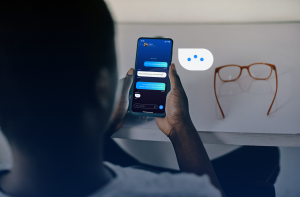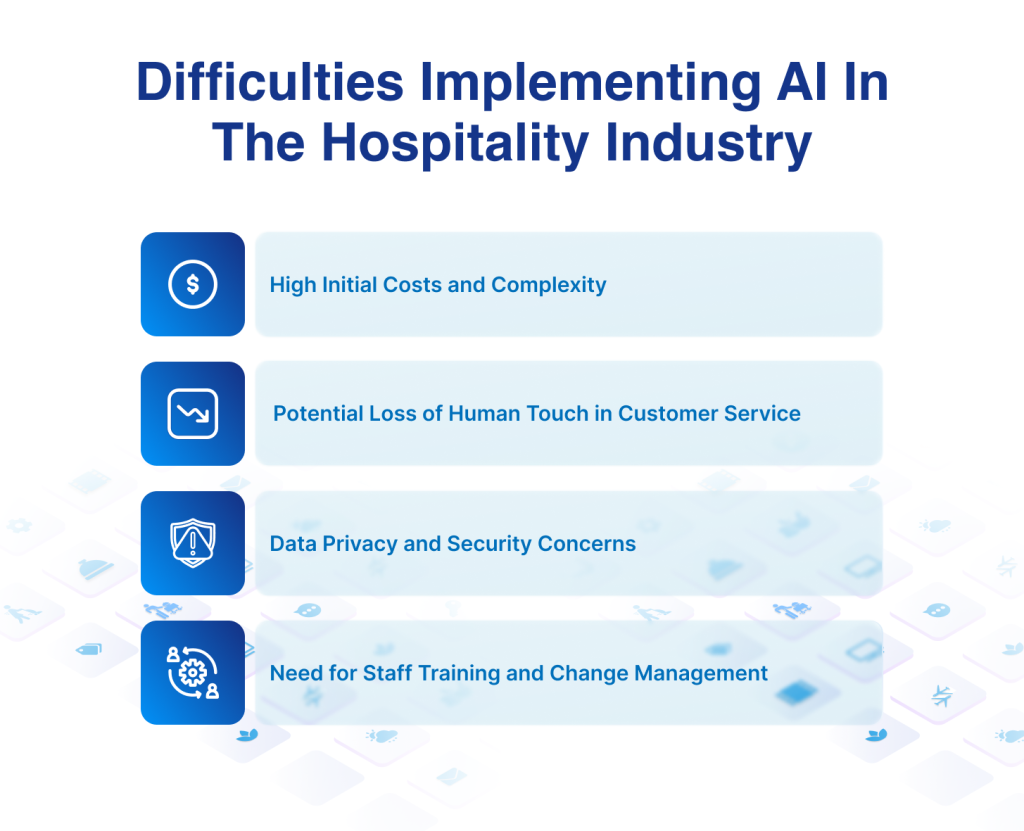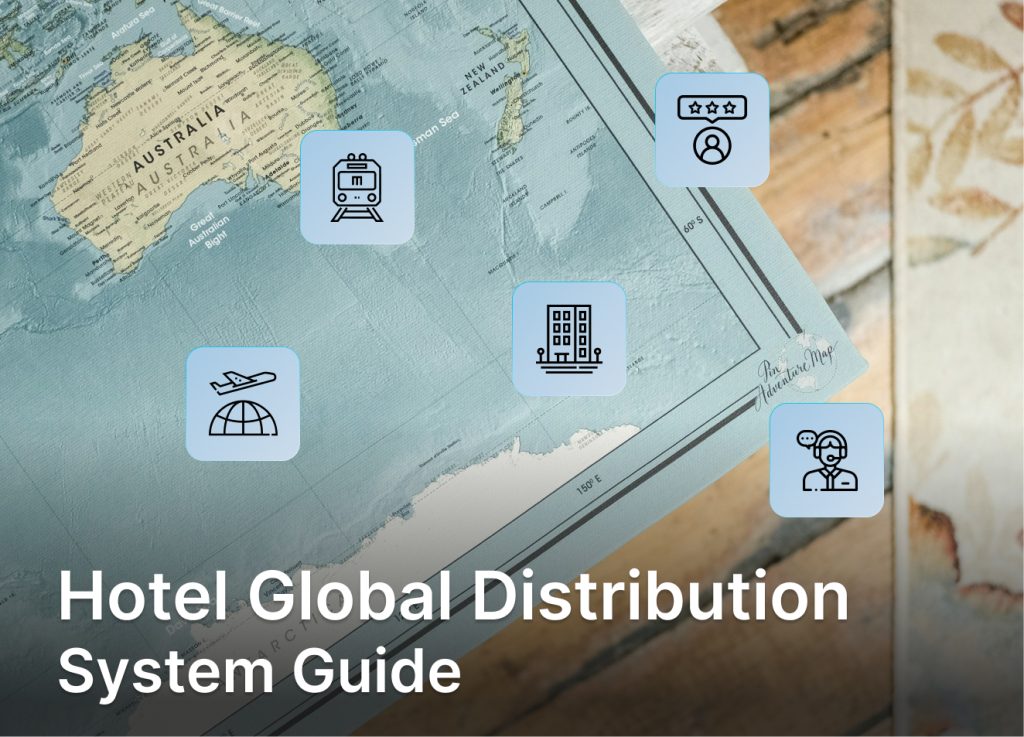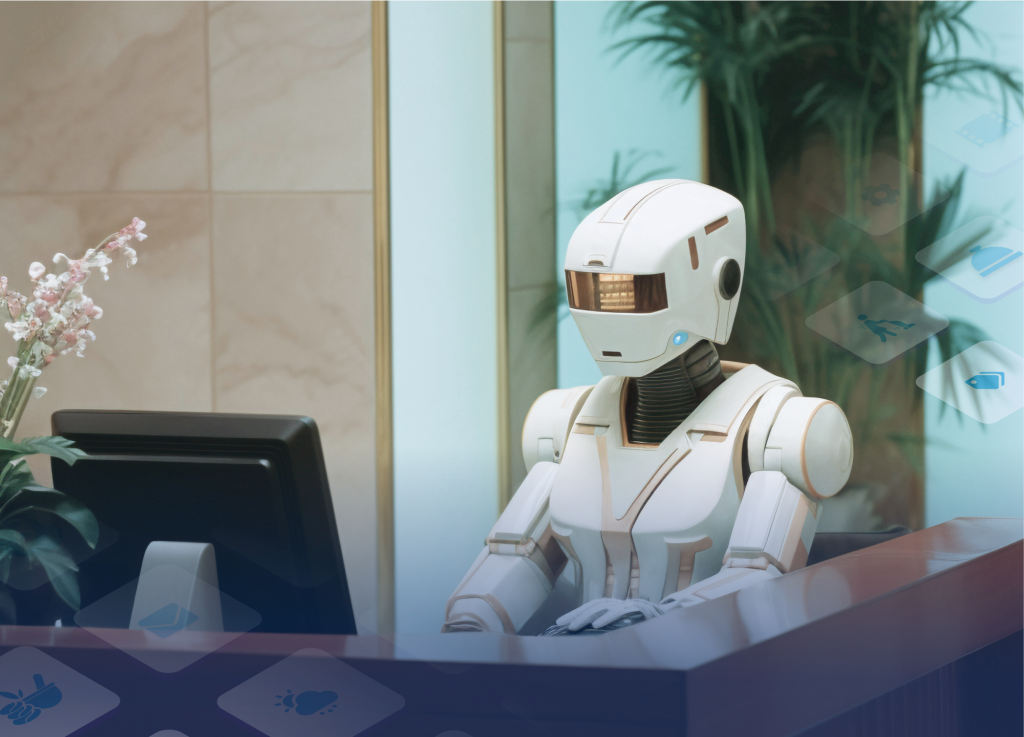Artificial intelligence, or AI, in the hospitality industry is rapidly changing the way hotels, resorts, restaurants, and travel companies operate. While the sector is known for its emphasis on personalized service and customer satisfaction, there was little choice for in-room guest entertainment in the past. There would likely be a TV, maybe with movie rental options for extra revenue.
But thanks to advances in entertainment technology solutions, contemporary hotels offer more amenities to enhance the visitor experience.
AI in travel and hospitality has revolutionized customer service and optimized business processes, producing personalized experiences and higher efficiency in several ways. If you’re a hotel, B&B, guesthouse, or resort owner, you may want to know more about these recent advancements in hotel technology.
Keep reading this piece as we uncover the roles, impacts, and uses of AI in hospitality—and how your establishment can benefit from these advancements without breaking the bank.
- Hotels can use artificial intelligence (AI) to provide personalized experiences, run their businesses more efficiently, and boost customer service with chatbots and smart assistants.
- The travel and hotel AI market is expected to grow more than 9.7% per year between 2021 and 2026.
- Conversational AI in hospitality can rapidly translate and converse with individuals in around 100 languages.
- AI-powered chatbots allow you to provide your visitors with accurate and fast responses to online inquiries.
- By using a robust and affordable IPTV solution, hotels can turn their smart TVs into income-generating smart assistants while also providing a large spectrum of entertainment choices for guests.
The Role of AI in the Hospitality Industry
Comprising hotels, resorts, restaurants, and travel agencies, the hospitality industry finds great challenges in meeting the ever-evolving expectations of modern consumers.
Online booking systems, social media, and review websites play a major role in helping industry players understand guests’ expectations in the digital era. Generally, hotel guests value perfect relationships, tailored experiences, and fast services.
The amazing ability of AI in hospitality to spot trends, look at huge amounts of data, automate tasks, and make smart decisions is completely changing how the industry interacts with consumers and manages business operations.
Through the use of AI-driven tools, such as chatbots and virtual assistants, hotels and restaurants can:
- Offer 24/7 customer support, providing instant responses to inquiries and enhancing the overall guest experience.
- Create more personalized services by analyzing customer data to tailor recommendations, whether it’s for room preferences, dining options, or travel itineraries.
- Optimize inventory management, predict demand, and streamline booking processes, reducing operational costs and improving efficiency.
Predictive analytics in hospitality also unlocks enhanced income management by way of dynamic pricing methods, predictive maintenance to reduce downtime, and data insights to improve decision-making.
The use of AI in hospitality is fast becoming an imperative to transform the quality of services and drive business growth.
According to Industry ARC, the travel and hotel AI market is expected to grow more than 9.7% per year between 2021 and 2026, reaching a value of $1.2 billion by 2026.
The rapid adoption of AI in the hospitality industry highlights a significant shift where businesses must keep up or risk falling behind their competitors. With the advent of generative AI, the stakes are even higher.
These technologies allow hotels and other hospitality companies to transform their marketing efforts, reshape the guest experience, and expedite daily operations, from bookings to room amenities management.

Applications of AI in Hospitality
The applications of AI in travel and hospitality are wide-ranging and diverse. From catering to guests and improving employee satisfaction to making data-driven decisions and generating additional income, artificial intelligence is a game-changer for businesses.
For instance, an AI-powered application can identify times when demand is strongest, and the cuisine is most preferred by various kinds of visitors. This knowledge can enable hotels and restaurants to waste less food, enhance their menu, and effectively manage their inventory. But that’s just one example. Other applications of AI in the hospitality industry are given below.
1. Rapid Responses to Guest Reviews
Building an excellent brand reputation, attracting new customers, and retaining returning visitors largely depends on reviews from former guests and how a business responds to them. Still, leaving responses is not the only crucial aspect. They also need to be speedy in order to address any issues and maintain a good public image.
AI in the hospitality industry includes AI-powered tools that use natural language processing (NLP) algorithms to analyze the sentiment and content of reviews in real time, categorizing them based on urgency or specific issues. This allows hotels and restaurants to prioritize responses and address guest concerns promptly, enhancing customer satisfaction and reputation management.
Using automation, AI can also enable the rapid generation of carefully considered responses. This demonstrates a great degree of professionalism since it shows respect for the remarks of visitors and a dedication to reacting quickly to them. According to a Harvard Business Review analysis, hotels that react swiftly to internet comments obtain 12% more reviews and score better overall.
2. Multi-Language Support
The global nature of the hospitality industry requires hotels to effectively communicate with guests from diverse linguistic backgrounds. But finding staff members who speak various languages presents a whole set of different changes. Why not assist visitors in the language they speak using AI in the hospitality industry?
AI-driven language translation tools provide real-time, multi-language support, breaking down language barriers and ensuring that non-native speakers receive the same level of service as local guests. These hospitality chatbots and virtual assistants can rapidly translate and converse with individuals in around 100 languages. Even a simple, smart TV management platform can offer automatic language selection for personalized services. This seamless communication improves the guest experience and broadens a hotel’s appeal to international travelers.
3. Tailored Room Layout
AI in hospitality enables hotels to offer guests a more personalized stay. For example, AI systems can save the preferences of every guest for lighting, temperature, and entertainment choices.
By analyzing data from previous visits or guest profiles, AI can also suggest room configurations that best suit a guest’s requirements, such as arranging furniture for business travelers or families with young children.
Some advanced AI systems can even allow guests to customize their room layout before arrival, ensuring their stay is perfectly suited to their comfort and convenience. This level of personalization boosts the overall guest experience, making stays more comfortable and memorable.
4. Optimized Staff Schedules
Closely planning the schedules of your team members is rather vital. Thanks to AI in the hospitality industry, like AI-driven workforce management systems, hospitality businesses can schedule staff for optimal coverage and efficiency. These systems use predictive analytics to forecast demand based on factors like booking patterns, local events, and historical data, allowing managers to allocate staff more effectively.
This use of AI in hospitality prevents overstaffing or understaffing and improves employee satisfaction by creating more balanced schedules. It ensures that guests receive consistent, high-quality service while also controlling labor costs.
5. Targeted Promotions
As a hotel executive, you know that pricing analysis helps inform marketing strategies. But to be effective, campaigns must also be highly targeted to the right demographics. AI in travel and hospitality solves this problem, enabling businesses to analyze vast amounts of guest data to identify patterns and preferences.
This allows hotels and restaurants to create personalized promotions, such as special offers or loyalty rewards, that are more likely to resonate with individual guests. For example, a frequent business traveler might receive offers for early check-in or access to executive lounges, while a family might be targeted with promotions for local family-friendly attractions or dining discounts.
By delivering the right offer to the right guest at the right time, promotions driven by AI in the hospitality industry can significantly increase engagement and conversion rates.
When business is slow during the off-peak season, hotels can also use AI to devise ways to increase demand and generate income. Making special deals unique and more relevant to different demographics of visitors can drive sales in the quiet months.
AI in Hotel Entertainment: Interactive Smart TV Solutions
For weary hotel guests returning from a demanding day at work, dependable entertainment options are absolutely vital. With AI-powered interactive smart TV solutions, hotels can offer guests a highly personalized and immersive in-room experience. These AI hospitality solutions provide more than just viewing options—they integrate with voice assistants, streaming services, and hotel apps to deliver a seamless, customized experience.
HotelSmarters stands at the forefront of this innovation, offering a robust IPTV solution with key features and offerings such as:
- Interactive IPTV Solutions: IPTV services offering live TV, VOD content, and integration with popular streaming platforms like Netflix and Disney+.
- Smart TV Management: Integration with major platforms like Samsung Tizen, LG WebOS, Android TV, and Android STB, allowing hotels to provide a seamless and interactive guest experience.
- Customizable Middleware: Tailored hotel middleware that enhances guest experiences through personalized welcome messages, service suggestions, and easy in-room ordering directly from the TV.
- E-commerce Ecosystem: Built-in e-commerce solutions that allow guests to order services and products directly from their in-room TVs, supported by advanced reporting and personalized marketing.
- Advanced Revenue Management: Automated tools that track purchases and orders, optimize revenue, and generate analytic insights on room and service payments.
- Global Reach: Support for over 200 languages and services available in 30+ countries, ensuring a connected experience for guests worldwide.

Smart TVs allow hotels to install various apps and leverage innovative technologies like IPTV to provide their visitors with tailored content and keep them updated with the latest promotions, popular services, and available products.
HotelSmarters’ smart TV management platform gives you centralized control to customize notifications and updates like weather data, flight statuses, and information about local attractions—over and above interactive hotel services, movie rental apps (like Netflix, Hulu, or Crackle), in-room ordering, and access to internet-connected OTT apps.
A clever and intuitive solution can improve your hotel’s system administration and raise your visitors’ in-room entertainment experience. HotelSmarters’ platform is designed to be user-friendly for your staff while also providing a comfortable experience for your guests.
Turn your hotel room TVs into smart, income-generating assistants with HotelSmarters. Get in touch with us today and elevate your hotel’s offerings.
AI in Hospitality: Case Studies and Examples
The integration of AI in the hospitality industry has moved beyond theoretical concepts to real-world applications that are driving tangible results. From enhancing guest experiences with personalized services to optimizing operational efficiency, AI is making a significant impact across various facets of hospitality.
According to Accenture, annual economic growth rates are predicted to double by 2035 due to artificial intelligence. PwC’s research supports this, estimating that by 2030, artificial intelligence will boost the GDP of local economies by 26% and account for a whopping $15.7 trillion of the global economy.
Any company that wants to gain a competitive edge should pay close attention to advancements of AI in the hospitality industry.
Indeed, artificial intelligence is already influencing society, transforming the way people work, make consumer-driven decisions, travel, and live. Notwithstanding all of this positive development, the disadvantages of AI in the hospitality industry can have some negative consequences, particularly in terms of job loss.
According to a report by OECD, 14% of jobs in 21 countries are highly vulnerable to being taken over by robots. The report also discusses, though, how advances in artificial intelligence technologies have generated new employment opportunities.
Using AI-powered solutions shouldn’t necessarily have negative impacts on your workers’ employment status. If anything, it should make their jobs easier and improve business operations. So, what are some common examples of AI in the hospitality industry? Let’s look at a few of them.
1. Chatbots

Driven by artificial intelligence, chatbots like IvyQuantum allow you to provide your visitors with accurate and fast responses to online inquiries. Most chatbots operate seven days a week, twenty-four hours a day, so they can instantly respond to inquiries from guests at any moment.
The AI nature of such chatbots means they can pick up new skills and alter their responses to individuals during conversations. It’s an exciting form of generative AI in hospitality that allows such chatbots to learn continuously, providing better and more customized assistance over time.
2. Voice Assistants
Including voice assistants in hotel rooms will help your visitors have a far better overall stay. By uttering a few basic words, voice assistants such as Alexa enable visitors to easily manage the lights, temperature, and other room amenities.
Similar to chatbots, this use of AI in the hospitality industry enables voice assistants to learn from consumer preferences. As a result, they can provide individualized recommendations for restaurants, activities, and various facilities.
3. Automation AI
Automation and AI are transforming industries across the board by streamlining processes, reducing human error, and enhancing the efficiency of various operations. In the context of hospitality, automation AI can handle repetitive tasks such as booking management, check-ins, and even guest inquiries, allowing staff to focus on more personalized guest interactions.
This application of AI in the hospitality industry can optimize resource allocation, predict maintenance needs, and personalize guest experiences by analyzing data patterns. As a result, businesses that implement AI automation tools not only improve their operational efficiency but also provide a more seamless and tailored experience for their customers, ultimately driving higher satisfaction and loyalty.
Challenges and Considerations
While AI in the hospitality industry offers various advantages, its implementation comes with several challenges and considerations. Addressing these hurdles is crucial to ensuring successful AI adoption.

- High Initial Costs and Complexity: Implementing AI solutions may require significant upfront investments in technology, infrastructure, and integration with existing systems. This can be a heavy financial burden—especially for smaller hotels or independent restaurants. The complexity of integrating AI with current operations can also be daunting, requiring specialized knowledge and potentially lengthy installation and testing periods.
- Data Privacy and Security Concerns: The use of AI in hotels means the processing of large amounts of personal and sensitive data, such as guest preferences, payment details, and booking history. For some, this can raise significant privacy and security concerns—as mishandling or unauthorized access to this data could lead to breaches and a loss of trust. Ensuring that AI systems comply with data protection regulations like GDPR is critical.
- Potential Loss of Human Touch in Customer Service: One of the key differentiators in hospitality is the personal, human touch that staff provide. While AI can automate many tasks and improve efficiency, there’s a risk that over-reliance on technology could lead to interactions that feel impersonal or robotic. Guests may miss the warmth and empathy that human staff bring to service, potentially leading to dissatisfaction if AI isn’t balanced with genuine human engagement.
- Need for Staff Training and Change Management: Introducing AI into hospitality operations can bring about significant changes in how tasks are performed, which can be challenging for staff. Employees may need extensive training to effectively use new AI tools and adapt to automated processes. Without proper training and support, there’s a risk of operational disruptions, decreased morale, and resistance to change, which can undermine the benefits of AI implementation. Managing this transition carefully is essential to ensuring a smooth and successful integration.
While the benefits of AI are substantial, careful planning, investment in training, and a balanced approach to automation can help mitigate risks and ensure that the human touch remains a central part of the guest experience. By thoughtfully navigating these considerations, businesses can leverage AI in hospitality to enhance operations, improve customer satisfaction, and stay competitive in an evolving market.
Future Trends and Innovations
The hotel industry depends more and more on artificial intelligence since it offers new means for operational improvement and service enhancement. By allowing experiences to be customized in ways that were never feasible in the past, AI may entirely transform the hotel industry.
The future of AI in hospitality is poised to bring even more groundbreaking trends and innovations that will further alter the industry. We can expect to see the increased use of predictive analytics for personalized guest experiences, where hotels anticipate needs before they arise.
Through improved hotel operations, artificial intelligence (AI) could bring about a fresh degree of practical efficiency in the hotel sector. By applying artificial intelligence to their back-end operations, hotels can significantly improve their commodities, personnel management, and maintenance planning.
The enhanced capacity of artificial intelligence to examine vast volumes of data in real time will also empower hotels to maximize their resources and respond aggressively to demand fluctuations, therefore optimizing business continuity and growth.
By analyzing guest behaviors and preferences to create customized recommendations for places to dine, activities, and attractions in the vicinity, artificial intelligence already has the ability to significantly impact hotel services.
Innovations such as AI-driven robots for concierge services and automated housekeeping will become more common, providing both convenience and efficiency.
Additionally, the integration of AI with Internet of Things (IoT) devices will enable smarter, more connected hotel rooms that adapt to guest preferences in real-time.
Sustainability will also play a key role, with AI optimizing energy consumption and reducing waste, aligning with the growing demand for eco-friendly practices.
These trends, coupled with ongoing advancements in AI capabilities, promise to reshape the hospitality landscape, making it more responsive, personalized, and sustainable.
FAQs
What is the best AI for hospitality?
The best AI for hospitality depends on the specific needs of the business. Leading solutions include AI-driven platforms like HotelSmarters for smart TV management and guest engagement. These platforms offer a range of features, such as personalized recommendations and revenue management, which can significantly enhance both operational efficiency and guest satisfaction.
Will AI replace hotel management?
AI is unlikely to replace hotel management fully, but it will significantly transform and enhance it. With AI automation, hotel managers can spend more time focusing on the strategic and creative aspects of their roles. AI can also provide valuable insights through data analysis, helping managers make more informed decisions. That said, the human touch and leadership will always be essential in hospitality.
What is the impact of AI in the hospitality industry?
AI in travel and hospitality has a profound impact by improving efficiency, enhancing guest experiences, and driving revenue growth. It’s transforming how hotels, agencies, and restaurants operate, making them more responsive and efficient.
What are the ethical concerns of using AI in hospitality?
Ethical concerns include data privacy and security, as AI systems often collect and process personal guest information. There’s also the potential for bias in AI algorithms, which could lead to unequal treatment of guests. Ensuring transparency, fairness, and compliance with regulations is essential to address these concerns.
How can small hotels benefit from AI?
Small hotels can benefit from AI-powered automation, revenue management, and a hotel middleware platform that turns smart TVs into virtual assistants for customized in-room entertainment and additional income opportunities. AI can also help small hotels compete with larger chains by offering personalized guest experiences and optimizing pricing strategies based on real-time data analysis.
Conclusion
Although the hotel industry has numerous challenges, the development of artificial intelligence has created a world with countless opportunities. Personalized recommendations, virtual assistants, and chatbots, among other uses of AI in the hospitality industry, have greatly improved the guest experience.
Smart environments and significant operational efficiency gains in the hotel industry are just some of the results of merging AI with modern technologies such as IoT and robotics automation.
In today’s digital-first and customer-oriented landscape, AI gives hotels and resorts the tools to stay competitive, simplify processes, and offer superior service.
While the integration of AI comes with challenges, the potential for innovation and growth is immense. As technological advancements continue to emerge, the role of AI in hospitality will only become more significant.
Ready to unlock new revenue opportunities and elevate your guests’ experiences? Contact HotelSmarters today and gain a competitive advantage.










